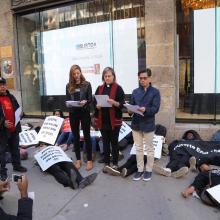Opinion
The world around me was constructed to, more or less, accommodate my faith.
But many Muslim students cannot take for granted what I, as a Christian, was able to take for granted.
Recently, in a letter to the Frisco Independent School District, the Texas attorney general’s office raised concerns about the constitutionality of a Muslim prayer room at Frisco’s Liberty High Schoo,l based on the establishment clause of the First Amendment.
The people writing, preaching, and claiming to know how to interpret "the" truth were almost entirely cisgender heterosexual white men in positions of authority in religious communities.
The resurrected Jesus is recognized not by his words but by his wounds, the wounds of his crucifixion. Herein lies a great irony. The crucifixion has left its indelible marks upon the resurrected one, such that the risen Jesus is recognizable only through them. On the one hand, resurrection has not erased his wounds. On the other hand, Jesus’ wounds no longer define him as a dead criminal, as determined by the state. Jesus doesn’t wince at Thomas’s touch. Even as his wounds remain, Jesus’ body is made whole and new.
Restoration and reconciliation with God is the ultimate goal. It is the incarnate Jesus who provides the way back for humanity to be restored and reconciled to God. This is the essence of the Christian faith.

Image via Kendrick Lamar Facebook
For what the singer/songwriter/music producer Pharrell said two years ago about Kendrick Lamar is absolutely true. Kendrick Lamar is the Bob Dylan of his generation, an American storyteller on the same plane as Toni Morrison, Eugene O’Neill, Pearl S. Buck, and other U.S. Nobel Prize in Literature laureates. Why this statement may seem overblown is because of highbrow bias against hip-hop, which is to say bias against black language, black storytellers, black people. But, to quote Chuck D, the leader of the rap group Public Enemy, hip-hop is “CNN for black people.” And Lamar is the best reporter in the business.

Abandoned diner along highway The Grapes of Wrath's "Mother road," Route 66 in Mojave desert on April 6, 2010. Rolf_52 / Shutterstock.com
Seventy-eight years ago, John Steinbeck published The Grapes of Wrath. It’s since become a staple in high-school curricula, offering a glimpse into our nation’s troubled history. But its lessons are just as applicable today in our hyper-polarized climate, in which empathy is often found lacking.
There was something about you there on that cross, that Good Friday.
There was something about your body there, about your manner.
Irony of all ironies, you were the “Son of God,” sent back to God by crucifixion.
Submissive obedience is deeply embedded in Christian theology. The origin of sin is attributed to Adam and Eve’s disobedience in the garden. Jesus, by contrast, is described as “obedient unto death” — an example we are taught to emulate. God is depicted as all-powerful, all-knowing, a king and lord and father with relentless control over all things. And we — broken, limited, and prone to mistakes — are meant to trust God in all things, and give ourselves over completely to God’s divine power. This call to submissive obedience is exemplified, more clearly than anywhere else, in Jesus’ willing submission to torture and death on the cross.
Good Friday is an invitation for us, every year, to ask: What is actually good about Jesus’ death on the cross? What about it is salvific, and what is it saving us from?

Philippines Drug War Protest on October 10, 2016 at the Philippines Consulate General NYC. Photo by Vocal-NY / Flickr.com
On April 10, New York Times journalist Daniel Berehulak received the Pulitzer for his photojournalism on the drug war in the Philippines. His gritty depiction of the killings in the Philippines, under President Rodrigo Duterte’s drug war, is perhaps fitting for Holy Week — calling to mind stark images of blood and crucifixion.
1. PHOTOS: Scenes from Holy Week Around the World
The Atlantic gathers stunning images as Christians around the world celebrate Holy Week and Easter.
2. The Civil Rights Luminary You’ve Never Heard Of
She was a poet, writer, activist, labor organizer, legal theorist, and Episcopal priest. Learn more about Pauli Murray in this great New Yorker piece.
When I asked Father Guy Wilson what the children of immigrant parents are telling him, amid the current inundation with media chatter, political rhetoric, and executive action on the topic of immigration, tears welled up in his eyes and one fell on his clerical shirt.
“It’s hard,” he said. “They are so scared.”
“Some of the teenagers have told me: ‘My parents are good people. They have never even had a traffic ticket. Why would anyone want to take them away from me?’”

Check-in area for Premier Access premium passengers at the United Airlines terminal at the Chicago O'Hare International Airport. EQRoy / Shutterstock.com
Someone lied. It’s more acceptable to say, “You’ve been bumped because the flight is overbooked,” than to say, “You’ve been bumped because we want your seat to fly our staff. That lie led to violence. Violence led to trauma for passengers, for millions of viewers, and for United, which sustained a $1.4 billion dive in stock value by Tuesday morning and now seems rested at a $255 million loss.
In so many of the gospel stories that are familiar to us, women were behind the scenes — always there, always present, always faithful — but nearly always in the background and hardly ever mentioned by the men in the stories, and certainly not the ones writing the stories. Their testimony as women was not even admissible in court under Jewish law; the word of a woman had no public credibility in that patriarchal culture. But God chose to reveal the miracle of Jesus' resurrection first to women. They were then told to report the astonishing news of the empty tomb to the men.
I first heard about the incident on the United Airlines Flight 3411 from my friend on social media, who was sitting directly behind Dr. David Dao and captured video footage of the encounter as the authorities asked him to get off the plane. Dr. Dao explained that he could not and would not because he had duties as a physician early the next morning and had been traveling for 24 hours. Video footage showing him being forcibly removed from the plane went viral and people are rightly discussing how he was treated and what United Airlines should do in response.
In God’s kingdom, everyone serves and everyone is served equally, no exceptions. Even the betrayer. Even the denier. Even the abandoner. Even the person who lives differently and believes differently. Even the person we simply can’t stand. Even the ones we consider unworthy.
The two major streams of Christian engagement on war are pacifism and just war theory, which comes out of Catholic social teaching. The pacifist response to Syria strikes is clearly opposed. As for the just war analysis, it takes a little explaining, but reaches the same conclusion.
Our current world is awash in constantly-expanding, shifting information. Librarians are on the front lines of this information explosion. They are positioned to not only help us navigate knowledge and data, but to make ethically informed choices about how to use it.
I recently had a conversation with a woman who used to be a church-goer when she was young, but hasn't found herself in a church setting in a while. When I told her I lead worship at a nearby church, she was interested in coming to visit. We in the church have theories about where we go wrong in bringing new faces into our buildings. Out in the world people go about their everyday lives, and we watch to see if they are a part of the church or outside of it.
But more deeply than that, framing Terence’s last gasp of life in the texture of local challenges shows the frailty of black Tulsa’s dream of equal treatment. We need to ensure Terence does not become another note on a scale of the pain felt by countless black and brown lives. It’s only been seven months and the voices of those affected by this history have been diminished.
In the midst of so much death, how can we Christians celebrate Easter?
These questions can be paired with questions regarding our own sense of worship on that day. How much have we Christians replaced justice with worship, not taking one into serious relation with the other? Are we accustomed to worship in the total absence of justice?














